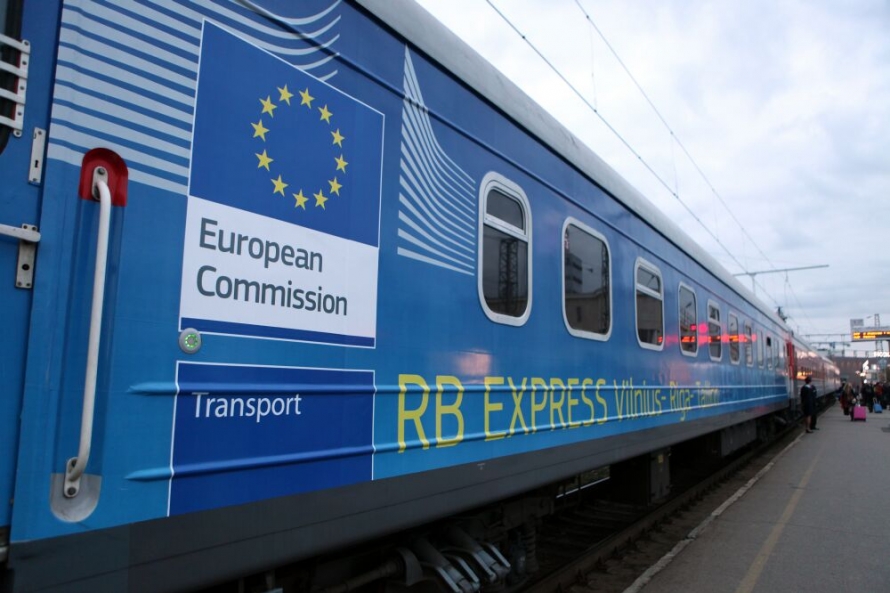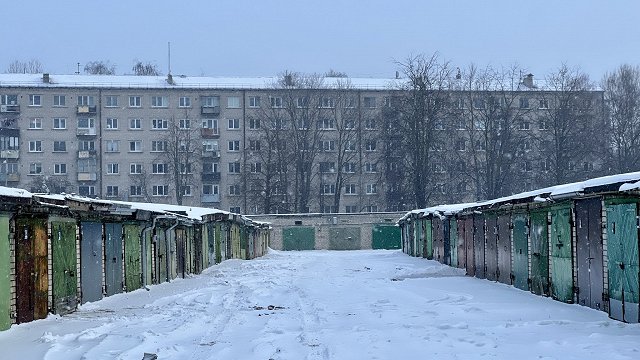Want to find out more? Naturally, you will turn to the internet. But entering 'Rail Baltica' or any of the other variants by which the project has been known over the years (Rail Baltic was big for a while and RailBaltica is sometimes seen), brings up a bewildering number of dead ends, out of date information and inaccuracies.
LSM rounds up some of the problems below in hopes that those in charge of the project might consider culling dead websites and updating information where necessary. Prepare for departure...
www.railbaltica.com
Let's take a guess and just type in railbaltica dot com. Oh dear. There is nothing here other than an offer from the owner of the domain that we can buy it for a cool €4,500 via an Austrian registry company. But it's due for renewal in June this year. Time to move on...
www.rail-baltica.com
A website with no attribution and no contacts, though most of the information appears to be sourced from the Latvian Transport Ministry.
It appears to be linked to a conference that took place in 2007.
The most recent 'News' item dates from June 2006. Yes, it is 11 years out of date. Though to be fair they did keep sending out their 'Newsletter' until January 2008.
Bizarrely, the site also offers used car tests. The photo gallery may be a useful resource for anyone interested in the fashions and haircuts of the early years of this century.
Okay, as the Latvian Transport Ministry was mentioned, let's try their site. As we are using our browser set to 'English', we will automatically be directed to the English language page.
What we get is a picture of the Transport Minister and some dull blurb saying in essence that the Transport Ministry is the ministry responsible for transport. But we want Rail Baltica - surely there is a handy link to this massive, historic project? No.
But wait! We spy the words 'Rail Baltica' bottom right in a Latvian language press release. Click on it and what happens? Nothing. You are rooted to the spot. The page simply refreshes (In fact, the press release is about growing support for the RailBaltica project).
If we are daring and click into the Latvian language site we see not one but TWO DIFFERENT graphic links to TWO DIFFERENT 'Rail Baltica' websites on the left hand side of the page! (listed below)
railbaltica.info
More promising, and in English too! There is information about the project dating from November 2014 and contact details for RB Rail (which is now actually in charge of the project, though the casual user would not know that).
There is a little disappointment clicking on the 'Information' section to be told: "As the official project language is Latvian, all the documentation is unfortunately available only in Latvian." So this must be only about the Latvian bit of the project?
Clicking on the various other sections makes it pretty clear that the English pages at least were last updated in December 2014 at latest. Quite a lot has happened since then.
Inspiration! If the EU is paying for most of the project, let's search for 'European Commission Rail Baltica'. Hey presto! Up pops a page of information last updated in July 2016 with details of the project and an estimated cost of €5 billion, though there is also a note saying:
"The Commission gives no warranty and makes no representation, whether expressed or implied, that the Project Information is error free. The Project Information is provided without any guarantees, conditions or warranties as to its accuracy."
However, that's that in the bottom right corner? A link to what must be the official site! Let's click!
railbaltica.org
We finally hit paydirt. This is the official site of the project (though there is nothing actually telling us that fact). The English language content does contain quite a few statements of the blindingly obvious such as "Rail Baltica will be built using the most up-to-date technologies and materials" and "Rail Baltica will be built according to the most stringent safety requirements", as if the alternative would be to build it from wood and string with a cavalier attitude to crashes.
One key fact to note is "Overall Rail Baltica budget is around 4 billion Euro with European Union support up to 85%." We've saved a billion euros just by clicking from the European Commission's info!
You need to scroll down the page quite a way to realize the site covers Lithuania and Estonia as well as Latvia (which is listed first and in much more detail than the other two). Our neighbors may not be too happy about this.
Estonia gets barely a passing mention and the final nugget of information about it sounds positively desperate: "2022: One of the objective of construction work is to get as much built as possible by this year."
Again there is a feeling some of the text is pretty old with text such as "Currently, Lithuania conducted the “Rail Baltica” construction from the Polish and Lithuanian borders to Kaunas. The works will be completed till end of December 2015." That's use of the future tense for things which presumably are in the past.
More positively there is a news story from as recently as 8 February this year and the news section seems to be updated a couple of times per month.
railbaltic.info
Hello, here's another one. The blue, white and black tells us this must surely be Estonian! And so it is, with the crest of the Estonian Transport Ministry and a dazzling array of other logos across the bottom of the page.
The information in English here dates from July 2015. We recognize a few of the phrases, such as "One of the objectives of construction work is to get as much built as possible by 2022." Mister Copy and Mister Paste have clearly been busy.
On the key question of how much the whole thing will cost, the Estonians come up with a clever strategy:
"Based on the current planning data as of November 2014, constructing the Estonian part of the Rail Baltic route will cost approximately 1.1 billion euros. Estonian self-financing in the project will be approximately 500 million euros divided over ten years."
Now let's turn to social media, as that gets updated all the time, doesn't it?
Twitter account Railbaltic (@railbaltic_eu) is a Lithuanian account giving "Latest news about railways transport of Northern Europe". Basically, trainspotters. Nothing to do with the project.
EM140 is designed to measure parameters of a railroad and help to make decisions for improvement. See and read more:https://t.co/owzdxJBHum pic.twitter.com/HbPmz9hDun
— Railbaltic (@railbaltic_eu) February 3, 2017
Surely an account called @RailBaltica must be the official Twitter account for the whole project? Hmm, well maybe it once was, as it trumpets the project and uses an official logo.
It appears to be some kind of official account set up by Lithuania in December 2012. It managed a grand total of 7 tweets before deciding no more were necessary a couple of months later.
„Rail Baltica“ numatomas vidutinis keleivinių traukinių greitis galėtų siekti 120 – 160 km/h!
— RailBaltica (@RailBaltica) March 28, 2013
If you happen to speak Lithuanian, the first of the tweets contains a link to a site with "official information" about Lithuania's involvement with RailBaltica. It still works and has some very impressive videos and interactive maps -- at least in Lithuanian. The English-language content is limited to what reads like another source of copy-pasted material that must be at least a couple of years old as it says: "As most of the activities on the Lithuanian territory are implemented in the 2007-2013 EU funding perspective and they are to be completed by the end of 2015."
Still, this video uploaded to YouTube in October 2015 is worth watching.
If there is an official Rail Baltica Twitter account, we couldn't find it using Twitter's search field.
The Lithuanians also appear to have bagged the Facebook page for Rail Baltica. Its most recent post is from January 2016.
Interestingly there is also a Facebook discussion group on the subject of Rail Baltica. If you want to find out what they are talking about, you'll need to be let in as a member, as it is a closed group, though the membership list does suggest a high proportion of the 246 members are Latvians.
To their credit, the Facebook group seems to be a lot more up to date and clear about their purpose than most of the other sites we have visited, declaring:
"This is totally independent and unofficial group, not realated to any body in charge of Rail Baltica / Rail Baltic project. Information exchange about "Rail Baltic / Rail Baltica" project, as well as issues and practices related to it. Basically in Latvian and English, but other languages related to the "Rail Baltic / Rail Baltica" route are also welcomed."
CONCLUSION: It would be great to have one obviously official website containing regularly updated content about the whole project from all the countries involved.
































